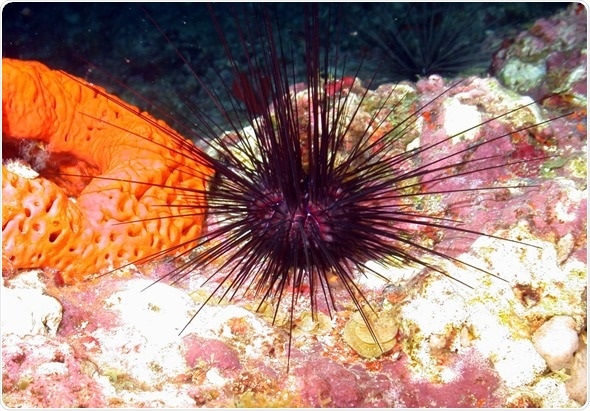Sep 30 2017
Genes which determine animal complexity – or what makes humans so much more complex than a fruit fly or a sea urchin – have been identified for the first time.

What makes us so different to a sea urchin? Sea urchins have just one NCoR gene, while humans have two
The secret mechanism for how a cell in one animal can be significantly more complex than a similar cell in another animal appears to be due to proteins and their ability to control ‘events’ in a cell’s nucleus.
The research, by biochemist Dr Colin Sharpe and colleagues in the University of Portsmouth, is published in PLoS One.
Dr Sharpe said:
Most people agree that mammals, and humans in particular, are more complex than a worm or a fruit fly, without really knowing why. The question has been nagging at me and others for a long time.
One common measure of complexity is the number of different cell types in an animal, but little is known about how complexity is achieved at the genetic level. The total number of genes in a genome is not a driver, this value varies only slightly in multicellular animals, so we looked for other factors.
Dr Sharpe and MRes student, Daniela Lopes Cardoso interrogated large amounts of data from the genomes of nine animals – from humans and macaque monkeys to nematode worms and the fruit fly, and calculated how diverse each was at the genetic level.
They found a small number of proteins which were better at interacting with other proteins and with chromatin, the packaged form of DNA in the cell nucleus.
“These proteins appear to be excellent candidates for what lies behind enormously varied degrees of complexity in animals,” Dr Sharpe said.
“We expected to identify genes that interacted directly with DNA to regulate other genes, but this was not the case. Instead we identified genes that interacted with ‘chromatin’.
“Our results suggest that the increased ability of certain proteins to interact with each other to regulate the dynamic organisation of chromatin in the nucleus as a component of animal complexity.”
The results matter, he said, because biomedical scientists depend on better understanding human disease by studying it in animals. While this has value, there is an underlying concern that an animal model may be too simple to be useful, that results seen in a simpler animal may not correlate with what happens in a more complex animal.
Understanding the inherent differences in how animals are organised at genetic level and the limitations to interpretations that this imposes, will provide a more rational selection of appropriate animal models in biomedicine.
Dr Sharpe and team’s previous research found that three factors lay behind the proteins made by one gene – NCoR – being more diverse in complex animals such as humans compared to, for example, sea urchins:
- Gene duplication, although the total number of genes in the genome doesn’t vary significantly, some specific genes duplicate one or more times, for example there is one NCoR gene in sea urchin and two in humans.
- Single genes often make more than one protein. The messenger RNA (mRNA) that links gene to protein can be processed by ‘splicing’ to generate a range of different mRNAs, each of which encodes a related, but different protein. For example, the sea urchin gene produces just one type of RNA while in humans the NCoR2 gene produces well over 30 and each is likely to have a different function.
- Most proteins consist of domains that have a specific function. Dr Sharpe and team found that the number of domains increases, again with NCoR, from one in sea urchins to three in humans.